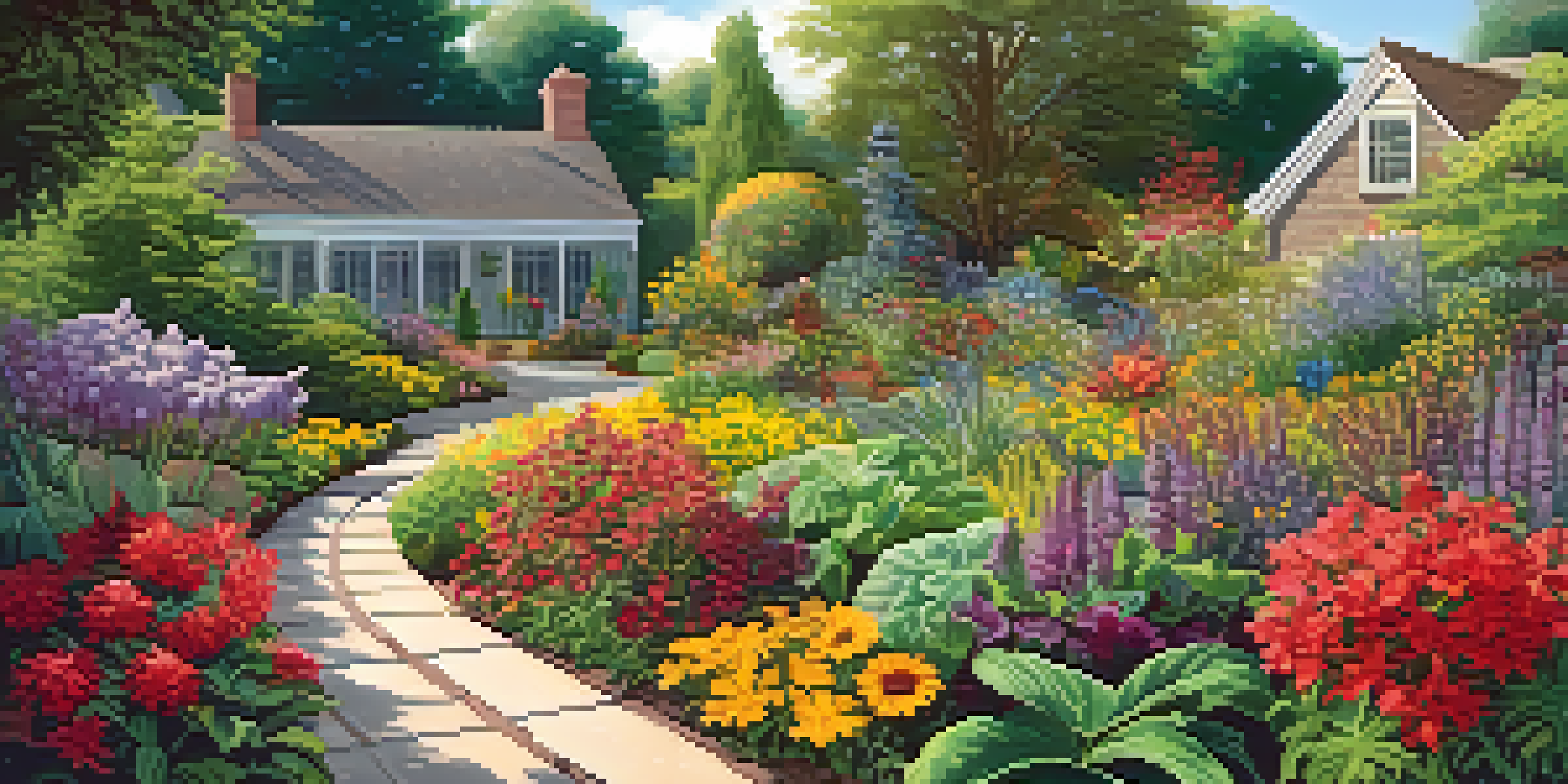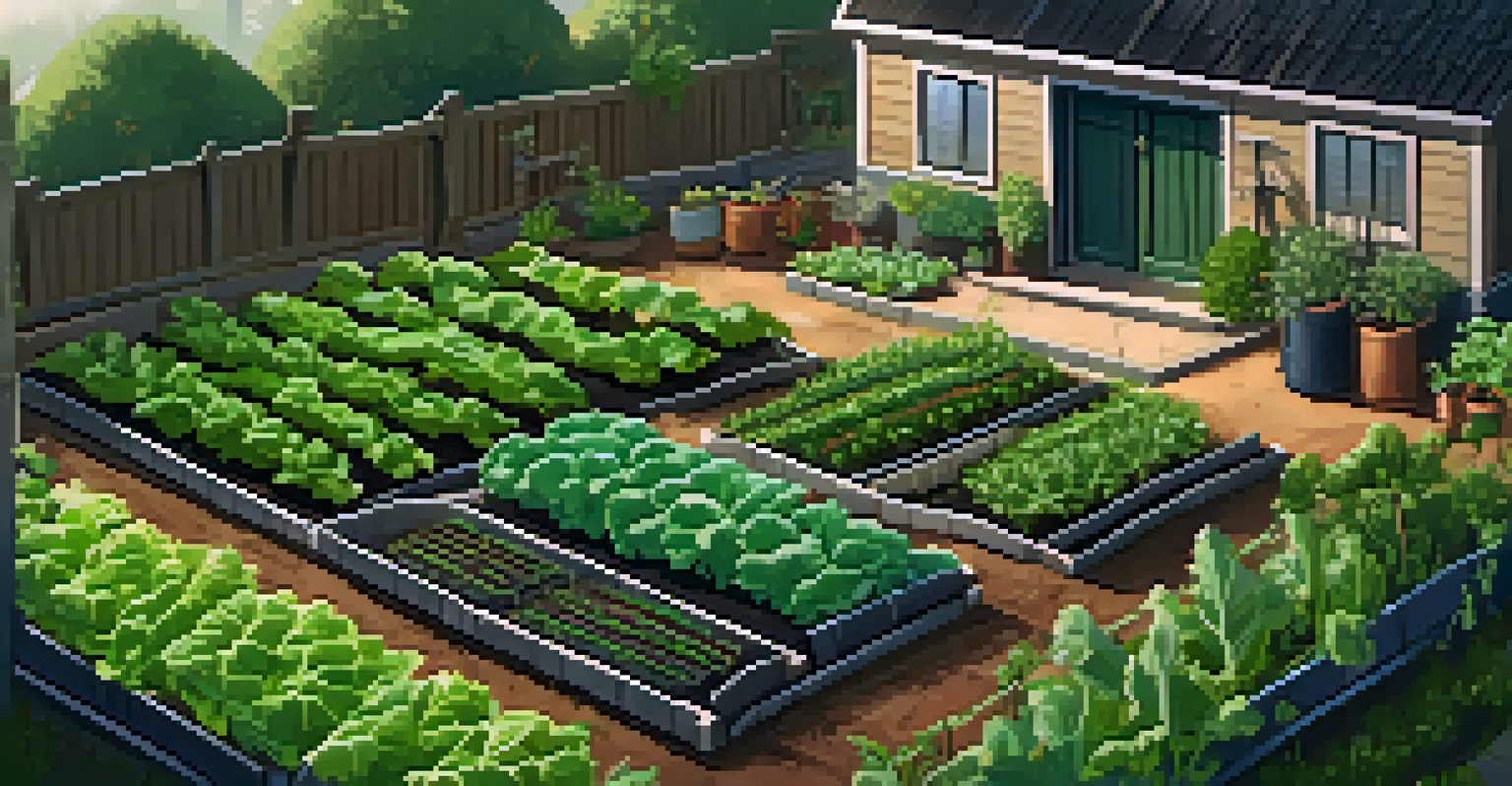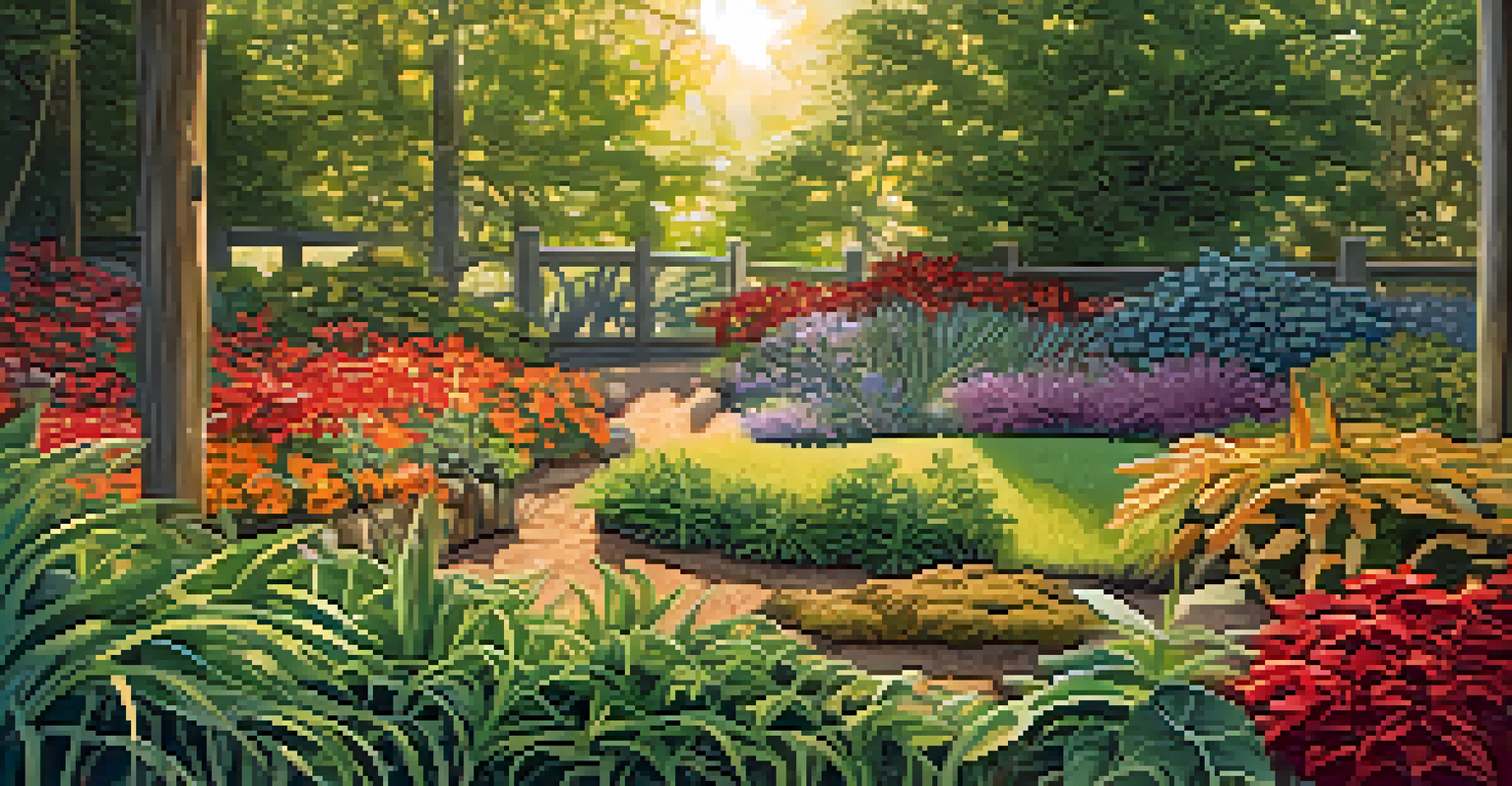Understanding the Basics of Sustainable Gardening Principles

What is Sustainable Gardening and Why It Matters
Sustainable gardening is a method that focuses on cultivating plants in a way that protects the environment. It emphasizes using practices that are eco-friendly and resource-efficient, ensuring that future generations can also enjoy gardening. By prioritizing sustainability, gardeners can contribute to the health of our planet, reduce waste, and promote biodiversity.
The greatest threat to our planet is the belief that someone else will save it.
Imagine a garden that not only provides fresh vegetables and beautiful flowers but also supports local wildlife. This approach allows you to create a thriving ecosystem right in your backyard, making it a win-win situation for both you and nature. Sustainable gardening practices can also lead to healthier plants and a more productive garden.
In essence, sustainable gardening is about working with nature, rather than against it. It encourages us to be mindful of our choices in the garden, from the seeds we plant to the methods we use for pest control. By understanding the principles of sustainable gardening, anyone can become a responsible steward of the environment.
Soil Health: The Foundation of Sustainable Gardening
Healthy soil is the cornerstone of a sustainable garden. It not only nourishes plants but also retains water and supports a diverse range of organisms. By focusing on soil health, gardeners can enhance plant growth and reduce the need for chemical fertilizers, which can harm the environment.

Practices like composting, mulching, and crop rotation are effective ways to improve soil quality. Composting helps recycle organic waste, enriching the soil with nutrients, while mulching retains moisture and suppresses weeds. Crop rotation prevents soil depletion by varying the types of plants grown in each area, promoting a balanced ecosystem.
Embrace Sustainable Gardening
Sustainable gardening practices protect the environment while promoting biodiversity and healthier plants.
Ultimately, investing in soil health pays off in the long run. Healthier soil leads to robust plants that can withstand pests and diseases, reducing the need for pesticides. By nurturing the soil, you are not just feeding your plants but also protecting the environment.
Water Conservation Techniques for Your Garden
Water is a precious resource, and conserving it is vital in sustainable gardening. By implementing water-efficient practices, gardeners can significantly reduce their water usage while keeping their plants healthy. Techniques like drip irrigation and rainwater harvesting are excellent ways to optimize water resources.
Nature does not hurry, yet everything is accomplished.
Drip irrigation delivers water directly to the roots of plants, minimizing evaporation and runoff. This targeted approach ensures that your plants receive the moisture they need without wasting water. Additionally, collecting rainwater in barrels can provide a free and natural water source for your garden.
By adopting these water conservation methods, you not only save money but also contribute to a more sustainable environment. Every drop counts, and being mindful of water usage can make a significant difference in your garden’s overall health and productivity.
Choosing Native Plants for Your Garden
One of the simplest ways to create a sustainable garden is by choosing native plants. Native plants are adapted to the local climate and soil conditions, making them easier to grow and maintain. Additionally, they provide essential habitat and food for local wildlife, promoting biodiversity.
By selecting plants that naturally thrive in your area, you can reduce the need for fertilizers and pesticides. Native plants require less water and are more resistant to pests, meaning less effort and expense on your part. They also help stabilize the local ecosystem, benefiting both your garden and the surrounding environment.
Prioritize Soil Health
Healthy soil is essential for plant nourishment and reduces the need for harmful chemical fertilizers.
Incorporating native plants into your garden design not only enhances its beauty but also supports the local ecosystem. Think of it as inviting your local wildlife to a feast, creating a vibrant and balanced environment that flourishes on its own.
Pest Management: Embracing Natural Solutions
Effective pest management is an essential component of sustainable gardening. Instead of resorting to chemical pesticides, which can harm beneficial insects and the environment, gardeners can utilize natural methods to keep pests at bay. This approach not only protects your plants but also promotes a healthier garden ecosystem.
Companion planting is one natural solution that can deter pests while enhancing plant growth. For instance, planting marigolds alongside vegetables can repel harmful insects, while attracting beneficial pollinators. Additionally, introducing natural predators, like ladybugs, can help control pest populations without the need for chemicals.
By adopting integrated pest management strategies, you can create a balanced environment where plants and beneficial insects coexist. This way, your garden becomes a thriving ecosystem, reducing the reliance on harmful substances and maintaining a healthier landscape.
The Role of Mulching in Sustainable Gardening
Mulching is a powerful tool in sustainable gardening that offers numerous benefits. By applying a layer of organic material, such as straw, wood chips, or leaves, you can help retain soil moisture, suppress weeds, and improve soil quality over time. This simple practice can make a significant impact on your garden’s health.
In addition to conserving moisture, mulch acts as a protective barrier against extreme temperatures, keeping the soil cooler in the summer and warmer in the winter. As the organic materials break down, they enrich the soil with nutrients, creating a more fertile environment for your plants to thrive.
Use Native Plants Wisely
Choosing native plants enhances your garden's resilience and supports local wildlife while minimizing maintenance.
Moreover, mulching reduces the need for chemical herbicides, promoting a healthier ecosystem. By incorporating mulch into your gardening routine, you’re not only boosting your garden’s vitality but also taking an important step toward sustainability.
Creating a Biodiverse Garden for a Healthier Ecosystem
Biodiversity is crucial for a thriving garden, as it promotes resilience and stability within the ecosystem. By incorporating a variety of plants, you can encourage beneficial insects, birds, and other wildlife to inhabit your garden. This diversity creates a balanced environment that supports plant health and reduces pest issues.
Consider planting a mix of flowers, shrubs, and vegetables that attract different species. For example, flowering plants provide nectar for pollinators, while specific herbs can deter unwanted pests. By fostering a diverse range of flora, you’re creating a habitat that supports a wide array of wildlife.

In essence, a biodiverse garden is not just aesthetically pleasing, but it also contributes to the overall health of the ecosystem. Embracing diversity in your gardening practices can lead to a more resilient garden that flourishes naturally and sustainably.